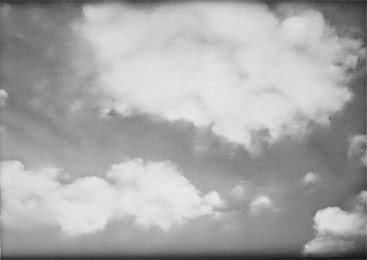Bildkälla: Filmologia
Aurélia Steiner (Vancouver) begins with a crack noticed in the stonework. Then the horizon appears, which has ‘the evenness of a huge crossing-out’. A smooth, frail voice intones, ‘I love you, beyond my strength. I do not know you.’ It is an incantation that digs into the film with its mystery, undermining its every image; river banks, clouds and trees. All these places with no origin or reference. ‘I am beautiful, so beautiful I am a stranger to myself. My name is Aurélia Steiner. I am your girl. I am informed about you, through me.’ ‘I’, ‘you’ … But what ‘I’, what ‘you’? Carried off by these fluctuating identities, and by the conjugation of all the tenses, the text is borne along by a multiple voice, with ghosts passing through, over three generations of a Jewish family. Gradually, this slow montage of black and white panoramas together seems to echo this name that might carry within it a landscape: Aurélia Steiner as water and stone? It in any case carries within it a whole memory: ‘Aurélia is there or elsewhere. She is broken, scattered throughout the film. She is there, as elsewhere, in every Jew; the first generation is her, as is the last.’
Från Collection FRAC Lorraine
Bildkälla: Collection FRAC Lorraine
Jag betraktar mig själv, jag kan inte riktigt urskilja mig i fönstrets kalla glas. Ljuset är så dunkelt, man skulle kunna tro att det var kväll. Jag älskar er mer än jag står ut med. Jag känner er inte.
[...]
Denna kyla från fönsterrutan, detta döda glas mot min kropp. Jag ser inte längre någonting av mig själv, jag ser ingenting mer.
Ur texten Aurélia Steiner från boken Fartyget Night


Inga kommentarer:
Skicka en kommentar